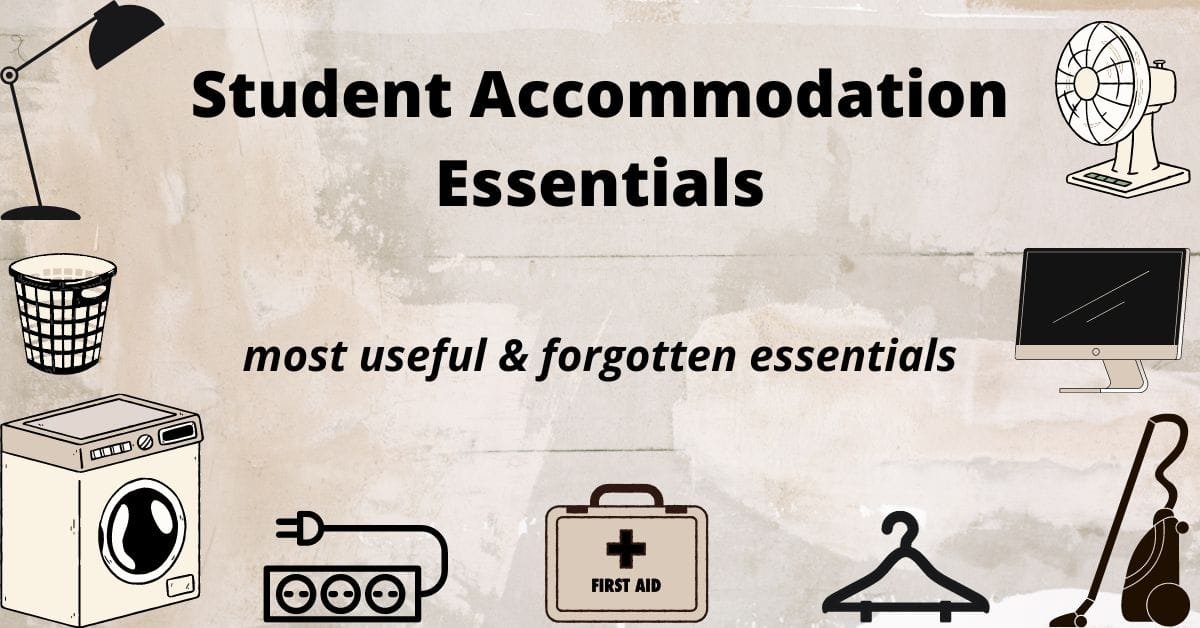Disclosure: The Graduate Samaritan is a free independent blog supported by its readers; this post may contain affiliate links that may earn a tiny commission to help the blog sustain itself, thank you for supporting this independent blog! (full disclaimer here)
One of the most underestimated aspects of student wellbeing is to improve sleep quality at university.
While exercise, diet, and mental health often take the spotlight, the benefits of good sleep are often overlooked—even though it is a cornerstone of academic and personal success.
In this guide, you’ll discover:
- The common causes and consequences of sleep deprivation among university students.
- Six practical, science-backed tips to help you sleep better.
- FAQs on student sleep to answer the most common (and less common) questions.
⚠️ Quick note: This article is for informational purposes only. If you struggle with persistent sleep issues, please seek advice from your GP or university wellbeing services.
💤 Why Quality Sleep Matters for Students
It’s no secret that sleeping well is essential for university life—especially with increasing academic demands. Research from the NHS shows that good sleep is just as important as eating a balanced diet or exercising.
Here’s why you should prioritise rest at university:
- Improved focus & concentration – essential for lectures and study sessions.
- Better memory retention – sleep consolidates learning, making revision more effective.
- Enhanced mood & reduced stress – good sleep supports emotional regulation.
- Cognitive performance – problem-solving and creativity are sharper after proper rest.
On the flip side, poor sleep can lead to fatigue, brain fog, irritability, and even long-term health problems.
😴 What Disrupts Student Sleep?
University comes with its fair share of challenges. Both external and internal factors can mess with your sleep routine:
External factors:
- Noisy flatmates or thin walls in student halls.
- Unfamiliar surroundings, traffic noise, or even seagulls (if you’re by the coast!).
- Shared accommodation where bedtime schedules clash.
Internal factors:
- Staying up late scrolling or gaming.
- Heavy caffeine use (coffee, energy drinks).
- Anxiety before exams or deadlines.
Together, these make quality sleep feel like a luxury—but it doesn’t have to be!
🚨 The Consequences of Sleep Deprivation
Poor sleep is more than “just being tired.” Studies from the Sleep Foundation highlight how chronic sleep deprivation affects learning and wellbeing:
- Reduced concentration during lectures.
- Memory lapses and difficulty retaining information.
- Irritability, stress, and low mood.
- Lack of motivation and productivity.
- Higher risk of burnout.
It also impacts daily life—cooking, cleaning, socialising and exercise. Essentially, everything becomes harder when you’re running on empty.
🧠 Recommended: Want to build a productive mindset? Check out our recommended reads — the Best Books for Success at University!
🎧 Bonus Tip: Check out the latest Audible Offers — you might be surprised how much value is included! It’s a great time to explore audiobooks and podcasts, which discuss complex topics in clearer, non-academic language, making them easier to understand and less overwhelming.
✅ 6 Practical Ways to Improve Student Sleep Quality
Let’s now go through our 6 practical methods to improve student sleep quality at university (p.n. all links to Amazon UK):
1. 🛏️ Make Your Bed Comfortable
Start with your environment. A poor mattress or flat pillow can ruin sleep and cause back pain.
- If you can’t replace your mattress, try a mattress topper (affordable and student-friendly).
- Invest in a quality pillow—it makes a bigger difference than you’d think.
- Wash your sheets regularly and keep your space clean—it signals your brain it’s time to rest.
- Flip or rotate your mattress every few months to even out wear.
👉 Tip: Some universities will replace damaged mattresses if you report it. Always worth asking!
2. 💻 Reduce Eye Sensitivity to Light
Blue light from phones and laptops suppresses melatonin, making it harder to fall asleep.
Try this routine:
- Enable dark mode on apps and devices in the evening.
- Use blue-light glasses or a screen filter app if you study late.
- Dim room lighting with an eye-friendly desk lamp instead of bright overhead lights.
- Create a “digital sunset” rule—no screens 30 minutes before bed.
This helps your brain wind down naturally.
3. ☕ Limit Caffeine Intake
Caffeine lingers in your system for up to 6 hours. That “one last coffee” at 6 p.m. could keep you awake past midnight.
Instead:
- Set a caffeine cut-off time (ideally before 4 p.m.).
- Swap your afternoon coffee for decaf or herbal tea (chamomile, peppermint).
- Try caffeine alternatives like matcha tea (check out our guide “The Best Coffee Alternative for Students“, where we discuss the benefits of match tea for university students!)
You’ll feel more in control of your energy levels and fall asleep quicker.
💸 Bonus: Free Amazon Prime!
Did you know? If you are under 22, or a full time Uni student in the UK — you can get Amazon Prime free for 6 months!
Here’s what you’ll get:
- 🚚 Free Next-Day Delivery
- 🎬 Amazon Prime Video
- 🎶 Prime Music
- 🎓 Student-exclusive deals
Sign up in minutes:
- Visit Amazon Prime & Click “Try Prime”
- Insert Personal Details
- Enjoy your Free Benefits!
p.n. Use your uni email address to sign up (.ac.uk).
🎓 Amazon Prime Student: The Ultimate Uni Perk!
- 🚚 Free Next-Day Delivery
- 🎬 Amazon Prime Video
- 🎶 Prime Music
- 🎓 Student-Exclusive Offers
4. 🧘 Manage Anxiety
Exams, deadlines, and student life can bring plenty of stress. Anxiety is a major sleep disruptor, but you can manage it with simple habits:
- Create a bedtime ritual: meditation, journaling, or reading (avoid screens).
- Try calming teas like chamomile or valerian root (but not right before bed).
- Take a warm shower—heat helps your body release sleep signals.
- Use white noise apps if silence makes your thoughts too loud.
Confidence from preparation also reduces stress—don’t underestimate revision schedules.
5. ⚖️ Balance Fatigue
Ironically, being too inactive during the day can make it harder to sleep at night. Balance is key.
- Wake up at the same time every day (even weekends).
- Do something productive daily: clean your room, run errands, or tackle small assignments.
- Include light exercise like walking, cycling, or a gym session.
A consistent routine helps your body clock regulate naturally.
6. 🎧 Try Earplugs and Eye Masks
Classic tools, but still effective.
- Earplugs reduce noise from flatmates, traffic, or late-night parties.
- Eye masks block light (street lamps, morning sun, or a roommate’s lamp).
- Weighted eye masks or silk versions add an extra touch of relaxation.
Even if you’re not light-sensitive, many students find masks and earplugs make falling asleep much easier.
👉 Recommended: Have a look at our Accommodation Essentials List, you will find lots of useful ideas there!
🌟 Final Thoughts on Student Sleep Quality
Good sleep is one of the best investments you can make in your academic success and personal wellbeing at university.
By improving your sleep environment, limiting stimulants, and building a healthy bedtime routine, you’ll boost memory, focus, and overall mood.
Remember—change doesn’t happen overnight (pun intended!). Start with one or two tips and build from there.
Sweet dreams and good luck with your studies!
📌 FAQs About Student Sleep
Noise, irregular schedules, stress, and caffeine are the main culprits.
The NHS recommends 7–9 hours per night for young adults.
Consistency matters more than the exact time—aim to sleep and wake at the same time daily.
Yes—short naps (20–30 minutes) can boost alertness without affecting night sleep.
Occasional all-nighters happen, but research shows they impair memory, focus, and health long-term.
Gradually adjust your bedtime by 15 minutes earlier each night until you reach your goal.
Yes, studies suggest they can reduce eye strain and help melatonin production.
Absolutely—moderate exercise during the day improves sleep quality (avoid heavy workouts late at night).
No. Alcohol may make you drowsy, but it disrupts deep sleep and REM cycles.
Don’t stay in bed frustrated. Get up, read a book, or listen to calming music until you feel sleepy.
Apps like Headspace or Calm can guide meditation and track habits, which many students find useful.
If sleep issues persist for weeks and affect your daily life, contact your GP or university health services.
🎓 University Essentials – Everything You Need for Uni
Did you know? We’ve put together tailored student essential lists to help you through every aspect of university life!
- 📝 Student essentials: Everything you’ll need to stay prepared, productive, and comfortable during a typical Uni day.
- 💡 Accommodation essentials: Make your space feel like home (and don’t forget the stuff everyone forgets!).
- 🖥️ Study from home essentials: Tools and tips to create a distraction-free, efficient study setup.
- 🥘 Kitchen essentials: From budget-friendly basics to smart cooking tools that make life easier.
- 🎧 Coolest gadgets for university: Level up your uni experience with tech and tools students actually use.



